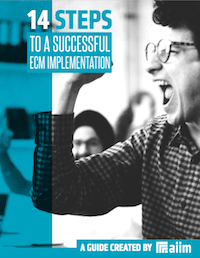The AIIM Blog
Keep your finger on the pulse of Intelligent Information Management with industry news, trends, and best practices.
Electronic Records Management (ERM) | Information Governance
Check out Monica Crocker's presentation on the impact of Information Governance at Land O'Lakes.
Share
Electronic Records Management (ERM) | Information Governance
Defensible disposition addresses the problem of over-retention -- organizations have been over-retaining electronic information and failing to dispose of it in a legally defensible manner when business and law will allow. The best way to address this monster problem is to break it into more tractable sub-problems: day-forward information disposition and historical informational disposition. I won’t go into a day-forward information disposition here, because it is an easier problem to solve. Let’s stipulate that it’s taken care of and focus on historical information disposition.
Share

Making an ECM implementation successful requires planning and attention to detail. The best way to create the right solution is to identify organizational goals and priorities. Learn how to manage a successful implementation in our free guide.
Electronic Records Management (ERM)
I recently did a webinar with Sue Trombley from Iron Mountain on the impact of the Obama Administration's records management initiative -- not just on the federal government, but on records management in general. The webinar was so much fun; I thought I would follow it up with a short series of questions with Sue. Here's the interview.
Share
Electronic Records Management (ERM) | Enterprise Content Management (ECM) | Sharepoint and Office 365
The AIIM Community offers a space for members of our community to share the information management best practices they've learned from experience on the job. These blog articles provide valuable insights. I was looking through the most popular blog posts for July and thought I would share my top ten here. The rules for qualifying: If you had more than one post in the top 10, I only took the top one. I only counted posts that were done in 2012. So congratulations to all of the following bloggers (and thanks for being involved in AIIM). And the envelope, please....
Share
Electronic Records Management (ERM) | Enterprise Content Management (ECM) | Intelligent Information Management (IIM)
Myth # 1. Records Management starts when the boxes of files go offsite. Reality: Records Management is a discipline that starts when a record – paper or electronic – is actually created. By waiting until a record is no longer active to begin tracking its movement and access, companies are missing an opportunity to make the record accessible, authentic, and reliable. These characteristics of a record are required by the courts and government auditors. So if you don’t recognize this early on, you face a “pay me now or pay me later” scenario if your company becomes involved in litigation and has to gather responsive materials. In “pay me now,” you take the necessary time to manage records correctly throughout their lifecycle. In “pay me later,” you spend significantly more time and expense gathering case-related materials with a greatly increased risk of incurring penalties and sanctions.
Share
Electronic Records Management (ERM) | Sharepoint and Office 365
Myth #1: It is too hard to implement “true” Records Management (RM) in SharePoint. Reality: Microsoft made SharePoint more of a retention tool with an interface that is familiar to SharePoint and IT professionals than an RM solution whose interface is familiar to RM professionals. “Out of the box” implementations of SharePoint RM require a wide variety of configuration settings, customizations, and choices that must be established and maintained by someone who is familiar with both SharePoint systems administration and retention policies. However, SharePoint add-on products are emerging that elegantly support the traditional principles and tenants of RM and enable the management of retention and disposition decisions based on information management policies in ways that are familiar to most RM professionals. These products fit into the familiar SharePoint user experience and enable enterprise RM with few of the penalties that some RM solutions have forced on SharePoint users, such as requiring users to understand multiple product interfaces and to search for information in multiple repositories.
Share